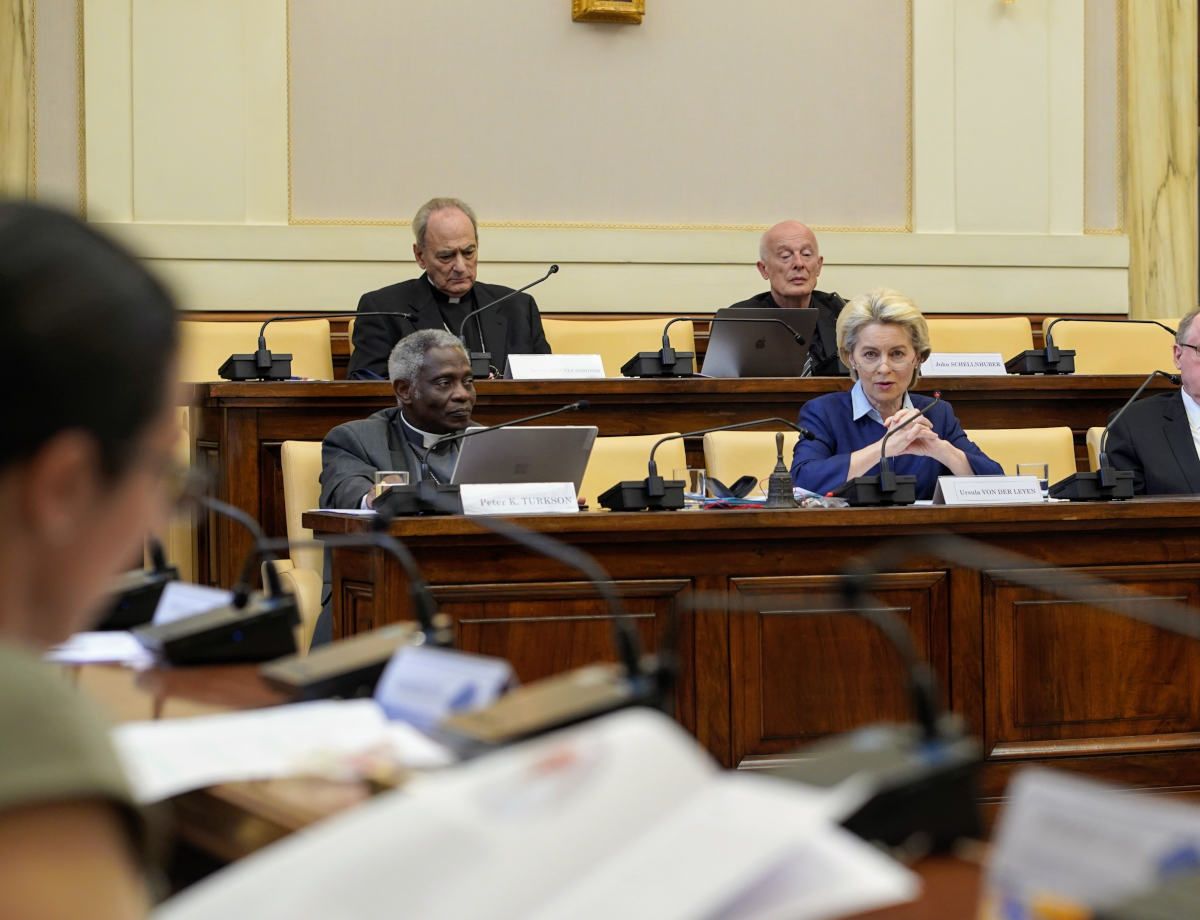
Making Demands in an Unaccountable Time
The development of frameworks for the common good are an essential tool for peaceful change. These are public challenges to power that can lay the groundwork for negotiation and non-violent action on topics from AI ethics to design justice and beyond. But as the material conditions of our societies continue to unravel, the political potential of the officiated rallying cry has narrowed, thanks to untested consensus and a shared aversion to stronger demands for accountability.
On 2 September, the Nobel Peace Center convened at the Freedom of Expression Conference to publish a 10-point plan to fix the information crisis. The Declaration is spurred by real and perceived decline in stability across the world, laying the blame of the eroding global political order at the feet of corporate technology companies:
We urge rights-respecting democracies to wake up to the existential threat of information ecosystems being distorted by a Big Tech business model fixated on harvesting people’s data and attention, even as it undermines serious journalism and polarises debate in society and political life.

The Declaration, with its focus on tech ownership and State response, mimics other statements from movements such as digital governance, design ethics and responsible machine learning. At its core, the plan urges democratic governments – particularly within the European Union – to identify the current economic incentives of platforms to act as a harbinger of chaos and disinformation. The plan calls for a mix of legislative and symbolic steps for accountability to be taken, emphasising transparency and cooperation to bring an end to surveillance-for-profit business models.
Despite the demand to end surveillance for profit, the Declaration itself proposes no genuine steps to accomplish this. Instead, the Declaration suffers from the same core flaw as the aforementioned movements. Rather than committing to pragmatic questioning of today's systems, what is proposed instead is a resistance to deeper systemic change. For the Declaration, this is the advocacy of a responsible new oversight where multinational tech corporations are compelled into actions that are fundamentally at odds with their business models (and therefore unsustainable while providing cover for an intractable position), and where advertisers are expected to use their money and influence to protect customers against the real harm caused by this portion of the tech industry. The Declaration, like the movements of design justice, digital democracy and AI ethics, accepts the status quo of big tech and limits the perceived possible political actions to reasoning with the culprits while accepting all of their starting assumptions.
Beyond the narrow scope of political potential, the Declaration’s calls for facts, trust and ethics are vague. Again, we see the same abstractions deployed in support of design ethics and the various responses to disinformation. The rallying cry may be just, but its potential is compromised by meanings and perspectives that dodge deeper systemic issues. In a world where billionaires buy major news outlets and corporate capture of government ever increases, how malleable do facts become? What does trust mean beyond a trite invocation to a common good in an age of collapsing economic equality?
More importantly, who is worthy of trust? We remain absent any description of how we reached this state, and are instead saddled with a recurrent unwillingness to interrogate deeper these fragile power structures. What can interventions like these achieve if we are unable to advocate for change beyond moral appeal to existing power?
“Many governments around the world” certainly are to blame for the dire state of information degradation today, but probably not the ones we imagine. The usual suspects are only part of a broader and complex cast of actors. The collapse of societal trust is driven by the visible decline of accountability that has yet to answer for deteriorating living standards, social cohesion and environment, all occurring under the watchful eye of the structures that are now appealed to for fixes. When referring to the contributions made by governments to today’s polycrisis, we assume the Declaration isn’t addressing the sins of self-professed 'democratic' exemplars. What does truth mean when considered alongside Emmanuel Macron’s self-contradictions after video evidence emerged of his top-ranking security advisor beating up protesters while disguised as a police officer? How can we call for trust in light of the Democrat-led expansion of ICE – an agency addicted to surveillance technologies – or the publicly funded BBC’s bitter “gender critical” editorial direction that sees it platform a frequent, rotating ensemble cast of unhinged far-right conspiracy theorists?
If we seek to demand a better information future, we must also hold accountable the power we at the same time turn to. Without this, the demands do nothing more than imply the presence of an Other, a conspiracy of foreign, ‘illiberal’ governments that plot the end of such a pristine model of democracy. States like Russia, Venezuela or Turkey certainly embrace their authoritarian streaks quite openly, yet to solely rely on a framing of rogue nations determined to “exploit these platforms’ greed to grab and consolidate power” is to exclude the complex set of historical circumstances that led to our current situation, such as NATO’s Operation Gladio’s influence on Turkey, the US-backed petro-dictatorship of Venezuela before the Bolivarian Revolution, or the 1990’s liberalisation of the USSR that crowned its current rulers and ushered one of the biggest drop in life expectancy ever seen in contemporary history.
Appeals to truth and ethics are compromised when they ignore the sobering reality that the big tech subject to such criticism is itself borne from the fertile policy landscapes of "rights-respecting democracies." We risk repeating the geopolitical sins of the 20th century if we do not confront the shared motivations of digital technologies supporting everything from the climate-refugee-detecting tech-led border control of Frontex, to the social media dragnets deployed under the guise of the war against terrorism that in the end target climate activists. Given that this situation is a direct consequence of the actions and inactions of governing bodies that are now appealed to, the absence of demands of accountability for past and potential anti-democratic actions by democratic powers ensures that the next generation of tech will be worse than the tech of today.
Thanks to the accelerating effectiveness of digital propaganda, information and data are commonly perceived as a pure substance – an ethereal entity that can fundamentally reveal the true nature of reality – if it weren’t for the political interventions of bad actors. But the morality of digital information is not constrained to the domain of its immediate political affects. Today’s digital societies are built from the most exploitative and destructive supply chains ever produced, exponential and always obfuscated. No mention in the Declaration of the material nature of information and digitisation: the servers, the cables, the snitch lines, the heavy metals, the energy consumption that drives this – it seems to us – suddenly very material information. One should follow investments, acquisitions, and other imperialist forays for resources rather than corporate free speech best practices in order to get an accurate picture of the real extent of our collective freedom. The information crisis is not just one of propaganda, it involves one of the most brutal constellation of labour exploitation and environmental annihilation imaginable. To debate the morals of purely digital information is to engage in a privileged metaphysical discussion that frets over the theoretical outcome while ignoring the actual, material destabilisation happening in real time. To engage with ethics as a thought experiment, essentially an interface-level only, is not enough.
Like design ethics, tech privacy and decentralisation, the 10-point plan to combat disinformation is anchored in myopic assumptions that must reckon with the structures that otherwise prevent our escape from the paradigm of State and corporate interests. At the same time as the Declaration was published, Cloudflare, the largest corporate infrastructure resilience service, resisted dropping a hyper-violent far-right harassment forum for years. This is an example of corporate resistance to “cutting off disinformation upstream.” Aside from opening new market opportunities, what is the point of requiring audits conducted by tech firms in an era of unaccountability?
Keffals, the driving force behind #DropKiwiFarms, describes her harassment at the hands of Kiwi Farms users. To hold Cloudflare accountable to its complicit actions, Keffals had to put herself in serious personal danger.
The definition of disinformation itself is deeply contested and uncertainty around the term is weaponised. Alongside labelling libellous far-right publications and other violent actors, the scope of what can be branded as disinformation is broad. In many cases, disinformation is deployed against those who contradict the imperialism du jour, be it the Kurdish Democratic Confederacy[1], the Zapatista, the new Chile Constitution[2], or actually independent media – particularly media produced by the working class[3]. At the same time, the right-wing press is engorged with money from the Kochs, Mercers and other neo-aristocratic families, while being spoon-fed ideas and even copy by the Heritage Foundation or the Federalist Society, a reactionary network decades in the making that manages to groom officials for the highest offices and is building alternative infrastructures to route around what little remains of the gains of a century of grassroot struggles.
We think that demands must include honest confrontation of the funding, framing and inadequacies of our own fields, from the well-meaning scholars to the constellation of NGOs and non-profits that populate the tech industry. Addressing the crisis of information requires divesting from a large part of the logistics upon which our violent yet brittle world is built on and, instead, employing existing or inventing new modes of collective ownerships for the infrastructure we consciously decide to inherit[4]. This is a form of ownership that should be ambitious, and look far beyond the paradigm of nationalisation or digitisation. For better or worse, communities must be able to dictate their engagement with the digital medium, both its liberating and ensnaring potentials, and reckon with the exploitative material reality at its base. We must refuse the universalist rhetoric of data and information, a narrow colonialist mode of capturing the world and engraving hegemonic narratives in stones.
We must be able to engage with radically different approaches to knowledge creation, archiving and dissemination with broad and negotiated definitions of accuracy and truth. This is a fundamental requirement for the process of decolonisation. And if the appeal of the techno-scientific gaze is too strong for some, then we must at the very least adopt the best facets of the scientific method. Information, data and software must become collectively-owned goods that can be peer-reviewed and shared freely. Not from an abstracted idea of “first principles,” but instead to the maximum extent of their practice, with their limits and power grabs understood[5]. The functions of such technologies must be de-scaled and localised so they can be fully appreciated by the communities that will make use of them, as well as discussed and amended with a high degree of technical and litteral accessibility. Said functions do not need to appear practical, but must be allowed the space to be poetic and at first sight irrational. We must embrace an anti-design ethos that seeks to relate to a broader experience of human and non-human life. Thus can we usher the conditions for a collective desire toward an unending technical imaginary, built on the contradictory and reciprocal play between us and existence.
What we are facing is not a crisis of information, but one of imagination.
As the New York Times titled: allies or terrorists?; for an actual understanding of the Kurdish struggle in all its complexity, and NATO’s collaboration with Turkey in their brutal oppression through Operation Gladio, see Dilar Dirik, The Kurdish Women’s Movement, History, Theory, Practice. ↩︎
Widely criticised by outlets such as the Washington Post or the Economist, two publications that supported Pinochet’s coup from day one and partook in fascist dictatorship apologia. For a deeper analysis of the recent coverage of the Chilean Constitution, see Adam Johnson's Substack ↩︎
A rhetoric that exhibits a heart-warming bipartisanship in the age of so-called polarisation ↩︎
Ideally one that isn’t blindly repeating the shareholding model with an added layer of digital abstraction. ↩︎
Jineologî appears to us as one of the best exemples of such a practice, certainly miles ahead the current scientific status quo gangrened by the control publishers exert over scientific peer review and access. ↩︎





